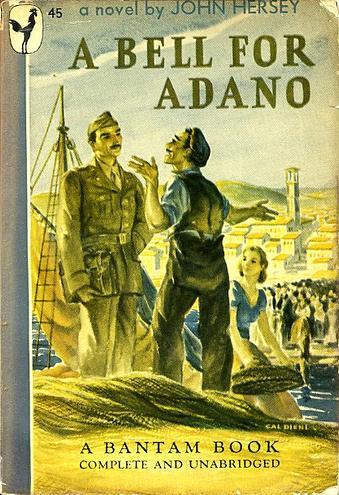9/04/2012
Book Look: A Bell for Adano, by John Hersey
This Pulitzer Prize-winning tale recounts the experiences of Major Victor Joppolo, an Italian-American officer put in charge of administering the American-occupied village of Adano, Italy in the final days of WWII. Joppolo’s ostensible mission is to rebuild the village’s infrastructure in the wake of the war and the toll exacted by decades of facist rule. However, Joppolo understands that he has been charged with a less tangible but even more important duty: to demonstrate the advantages of American governance/justice and win over the hearts/minds of the townspeople. To this end, he devotes himself to locating a replacement for a beloved and deeply-mourned town bell looted by the facists. I admit I quickly fell in love with Hersey’s beguiling characters, his courtly prose, and his gentle but penetrating eye for irony.
It is easy – perhaps too easy – to label the author’s depiction of characters in the novel as stereotypical, and his depiction of Joppolo’s attitude towards the citizens of Adano as condescending and paternalistic. At least part of the problem is that the charm of Hersey’s prose tends to mask the extent to which his characters embody both virtue and vice. Joppolo’s aide-de-camp cleverly humiliates a former facist official up to no good, but his intentions towards the women in the town are unabashedly crude. General Martin delights in liberating Italy from wicked facists, but thinks nothing of brutally slaughtering a donkey belonging to a peasant, simply because he has the temerity to get in his way. Even the actions of Joppolo are depicted as a recognizably human balance between idealism (believing in the superiority of the “American Way”) and vanity (wanting to win the love/admiration of the townspeople), loyalty (to his country) and disloyalty (to his wife).
In short, I believe that perceived anachronisms in this tale may accurately represent actual anachronisms that existed at this fascinating moment in U.S. history. It was a time when average villagers in small rural European towns genuinely were unsophisticated, when America genuinely did feel a paternalistic responsibility towards the rest of the world; a time when newly-minted Americans embraced cultural stereotypes as a way of celebrating their country’s diversity, and when American servicemen saw nothing hypocritical in idealizing their wives while simultaneously seeking the physical solace of foreign damsels. Hersey’s gift is helping us to see how these anachronisms have shaped (and continue to shape) the way the world has come to view Americans, and the way we have come to view ourselves.
Subscribe to:
Post Comments (Atom)

No comments:
Post a Comment